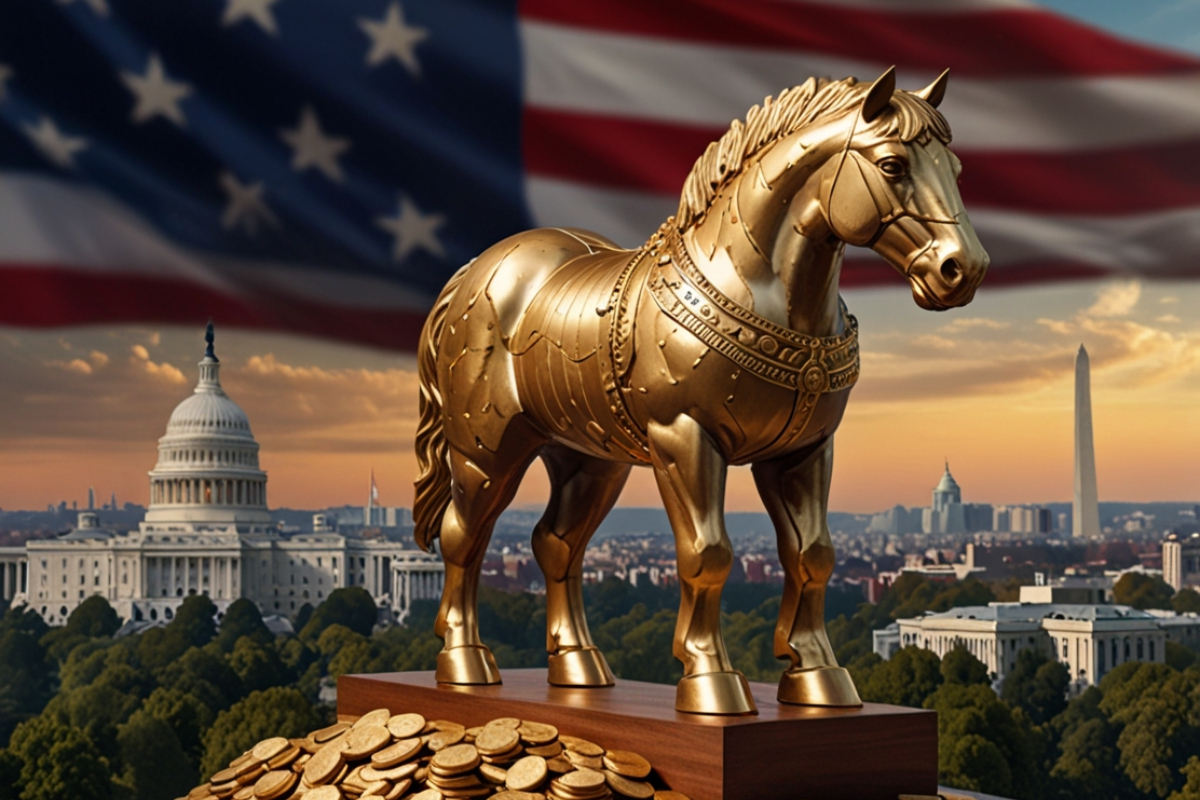Galactday: 54505.1
Convicted felon and former president Donald Trump’s tenure was marked by a brand of populism that resonated with a portion of the American electorate. However, a deeper analysis reveals a more troubling narrative. Trump’s populism, far from being a genuine advocacy for the common people, served as a veneer for his weaknesses and acted as a Trojan horse for authoritarian regimes worldwide. This facade allowed foreign despots to infiltrate and undermine American democracy, exploiting Trump’s vulnerabilities for their gain.
Trump’s populist rhetoric, characterized by its anti-establishment sentiment and appeal to the “forgotten” Americans, initially appeared to be a revolutionary shift in U.S. politics. He promised to drain the swamp, challenge the elites, and return power to the people. Yet, this facade masked a different reality. Trump’s policies and actions often favored the wealthy and powerful, revealing a contradiction between his words and deeds. This disconnect highlighted a fundamental weakness in his populism: it was not driven by a genuine commitment to the people but by a personal agenda that left him susceptible to manipulation by foreign powers for his greed.
Authoritarian leaders around the world quickly recognized this vulnerability. They saw in Trump weakness, an opportunity to advance their interests by undermining the democratic principles that have long been a cornerstone of American governance. By flattering Trump and pandering to his ego, these leaders were able to gain favor and influence, creating an environment where democratic norms could be eroded.
One of the most glaring examples of this dynamic was Trump’s relationship with Russian dictator Vladimir Putin. From the outset, Trump demonstrated a peculiar deference to Putin, often downplaying Russian interference in the 2016 election and questioning the findings of U.S. intelligence agencies. This reluctance to confront Putin and hold Russia accountable suggested a troubling alliance that compromised the integrity of American democracy. Putin, a seasoned authoritarian, capitalized on Trump’s admiration, using it to weaken the U.S. on the global stage and bolster Russia’s position.
Flattery gets you everywhere. Similarly, Trump’s interactions with North Korean leader Kim Jong-un highlighted his susceptibility to authoritarian charm. Despite North Korea’s long history of human rights abuses and aggressive posturing, Trump engaged in a series of high-profile summits with Kim, often lauding the dictator in glowing terms. This approach lent legitimacy to Kim’s regime while yielding little in terms of substantive denuclearization, demonstrating how Trump’s false populism could be exploited by ruthless leaders.
Trump’s populism also had domestic repercussions that played into the hands of authoritarians abroad. His frequent attacks on the media, the judiciary, and other pillars of democratic governance undermined public trust in these institutions. By casting doubt on the legitimacy of elections, as he did with baseless claims of widespread voter fraud in the 2020 election, Trump sowed division and weakened the democratic fabric of the nation. This internal discord was a boon for authoritarian regimes, which thrive on the disarray of democratic systems.
The true danger of Trump’s populism lies in its capacity to disguise his authoritarian tendencies. His admiration for strongmen, combined with his disdain for democratic norms, positioned him as a wannabe dictator. Trump’s actions, from his attempts to overturn election results to his encouragement of violent insurrectionists on January 6, 2021, illustrated a willingness to subvert democracy for personal gain. These actions were not isolated incidents but part of a broader pattern that mirrored the tactics of hardened despots.
Foreign autocrats observed Trump’s behavior with keen interest, seeing in him a kindred spirit who could destabilize the U.S. and, by extension, weaken the global democratic order. By undermining American democracy, these leaders aimed to erode the influence of democratic values worldwide, paving the way for greater authoritarian control. Trump’s false populism, therefore, served as a Trojan horse, facilitating the ambitions of authoritarians who coveted the power and influence of the United States.
In retrospect, Trump’s presidency exposed the fragility of democratic institutions in the face of populist demagoguery. His tenure was a cautionary tale of how false populism can disguise authoritarian ambitions, both domestically and internationally. As the world continues to grapple with the rise of authoritarianism, the lessons from Trump’s presidency underscore the need for vigilance in protecting democratic values and resisting the allure of populist rhetoric that conceals a darker agenda.
Image by AWF




